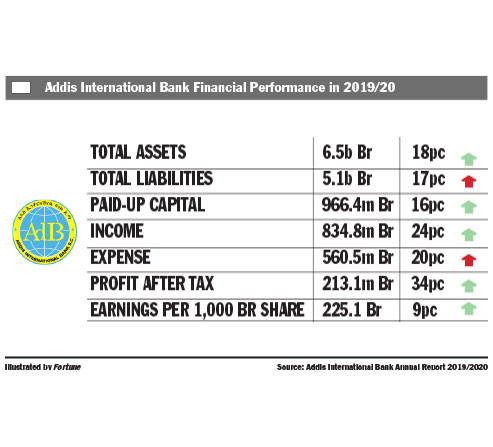
Viewpoints | Apr 15,2023
May 15 , 2021
By Yehualashet Tamiru
The establishment of a capital market is more or less a foregone conclusion. But it is imperative to address the loopholes existing in the current legal, economic and political situation for it be effective, writes Yehualashet Tamiru Tegegn (yehuala5779@gmail.com), adjunct lecturer at Addis Abeba University and an associate at MTA.
Recent studies demonstrate that the capital market promotes cost efficiency, improves liquidity and price discovery. Moreover, it encourages saving and investment, while reducing sovereignty risk, price volatility, efficiency and economies of scale. The effectiveness of a capital market is country-specific as it critically depends upon their legal, regulatory, and political environment.
Ethiopia had a short-lived capital market during the Imperial Regime. It was formally institutionalised in 1965 after the enactment of the Commercial Code half a decade earlier. However, it was abolished shortly after in 1974 with the downfall of Emperor Haile Selassie and the rise to power of the Dergueregime and its adoption of a command economy.
Begining in 1991, with the economic opening up, there were numerous calls to reinstitute the capital market in Ethiopia. The loudest voices were, unsurprisingly, the likes of the Addis Abeba Chamber of Commerce & Sectoral Associations. It was a call that went unheeded, with policymakers at the time famously describing it as a platform akin to casinos.
This attitude has changed with Prime Minister Abiy Ahmed's (PhD) administration. The Council of Ministers approved a draft law to introduce a capital market in Ethiopia. It has already been tabled for discussion before parliament. It will likely pass. Unfortunately, it will do as such while determinate factors that may keep the platform from being successful remain unaddressed.
Foremost is the availability of strong legal protection for shareholders. Because of the separation of ownership, there is a massive asymmetry of information between the real owners of the company and its insiders, the latter of which turn out to be the most influential persons. The real owners of the company often do not have sufficient information on the day-to-day activities of the company.
Thus, in the absence of adequate legal protection, the company and the minority shareholders are vulnerable to exploitation by the majority shareholders. This exploitation may take various forms: transfer pricing, asset misuse, profit allocation, acquisition of other business organisations that majority shareholders have a stake in and selling of the business as a going concern to other businesses to which majority shareholders have a stake. All of these shortcomings become reinforced and taken into overdrive through a stock market.
Therefore, a robust and well-functioning capital market requires the legal and normative instruments for investors to be confident that they will not be expropriated through forms such as self-dealing. Although there are scattered rules on the protection of minority shareholders to avoid exploitation by the majority shareholders under existing laws, the security it gives is neither comprehensive nor sufficient.
Another determinate factor is the existence of a stable macroeconomy. This primarily includes inflation. As a matter of rule, the actual rate of return for an investment is the annual percentage of profit earned adjusted to inflation. The real rate of return accurately determines the actual purchasing power of money over time. Therefore, if inflation is predictable, an investor can determine the real return of her investment.
Unemployment is another fact. If it is high, it simply means that people are not earning and hence unable to consume. This results in a lack of demand and similarly in a fall in supply as incentives go down. Let us also not forget the availability and stability of the exchange rate. Ethiopia is notorious for its acute foreign currency shortage. If foreign investors invest their money in the company but are unable to repatriate profits, no one is going to invest.
For the good part of the last 25 years, macroeconomic conditions have been volatile because of, among other things, a continuous rise in money supply, currency devaluation and depreciation, huge foreign and domestic debt, persistent current and budget deficits, and high inflation. Such macroeconomic instability may negatively affect the capital market.
A capital market, beyond a robust legal environment and stable macroeconomic condition, also needs strong and trusted institutions. Despite globalisation, foreign investors are still subject to the rules, principles, and practices of domestic corporate governance. Weak institutional control mechanisms may expose investors to a very precarious position. This situation is prevalent in developing countries such as Ethiopia, where weak regulatory institutions and poor corporate governance systems are rampant. A reasonable investor tends to invest in a transparent and orderly market. Because of this, a market that has sound institutional qualities proves to be effective and efficient.
The existence of institutional quality is measured by, among other things, a low level of corruption, political stability, protection of rule of law and the existence of effectiveness and accountability. For Ethiopia, many of these are questionable.
For half a decade now, the country has been shattered by political crisis and turmoil, with few signs that matters are due to improve. Moreover, there is entrenched and institutionalised corruption across the public sector. Political unrest coupled with pervasive corruption and lack of accountability would pose a huge constraint for the capital market in Ethiopia.
It is too late at this point to reconsider the establishment of a capital market. But it is imperative to address the loopholes existing in the current situation for us to have an effective and vibrant platform for improving economic efficiency and the determination of prices.
PUBLISHED ON
May 15,2021 [ VOL
22 , NO
1098]

Viewpoints | Apr 15,2023

Radar | Mar 23,2024

Agenda | Jan 07,2023

Commentaries | Dec 14,2019

Fortune News | Apr 03,2021

Radar | Jun 11,2022

Addis Fortune | May 04,2024

Fortune News | Jan 29,2022

Fortune News | Apr 30,2021

Commentaries | Oct 16,2021

Photo Gallery | 178712 Views | May 06,2019

Photo Gallery | 168908 Views | Apr 26,2019

Photo Gallery | 159747 Views | Oct 06,2021

My Opinion | 137105 Views | Aug 14,2021
Commentaries | Oct 25,2025

Dec 22 , 2024 . By TIZITA SHEWAFERAW
Charged with transforming colossal state-owned enterprises into modern and competitiv...

Aug 18 , 2024 . By AKSAH ITALO
Although predictable Yonas Zerihun's job in the ride-hailing service is not immune to...

Jul 28 , 2024 . By TIZITA SHEWAFERAW
Unhabitual, perhaps too many, Samuel Gebreyohannes, 38, used to occasionally enjoy a couple of beers at breakfast. However, he recently swit...

Jul 13 , 2024 . By AKSAH ITALO
Investors who rely on tractors, trucks, and field vehicles for commuting, transporting commodities, and f...

Oct 25 , 2025
The regulatory machinery is on overdrive. In only two years, no fewer than 35 new pro...

Oct 18 , 2025
The political establishment, notably the ruling party and its top brass, has become p...

Oct 11 , 2025
Ladislas Farago, a roving Associated Press (AP) correspondent, arrived in Ethiopia in...

Oct 4 , 2025
Eyob Tekalegn (PhD) had been in the Governor's chair for only weeks when, on Septembe...

Oct 25 , 2025 . By YITBAREK GETACHEW
Officials of the Addis Abeba's Education Bureau have embarked on an ambitious experim...

Oct 26 , 2025 . By YITBAREK GETACHEW
The federal government is making a landmark shift in its investment incentive regime...

Oct 29 , 2025 . By NAHOM AYELE
The National Bank of Ethiopia (NBE) is preparing to issue a directive that will funda...

Oct 26 , 2025 . By SURAFEL MULUGETA
A community of booksellers shadowing the Ethiopian National Theatre has been jolted b...